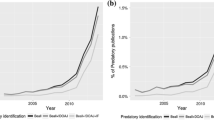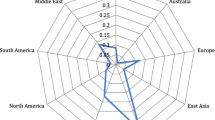Abstract
Not so long ago, a well institutionalized predatory journal exposed itself by publishing a hoax article that blew the whistle for its devastating influence on the academic affairs of a small country. This paper puts that experiment in context, gives all the important details and analyzes the results. The experiment was inspired by well-known cases of scientific activism and is in line with recent efforts against predatory publishers. The paper presents the evidence in detail and uses it to analyze the publishing practices of the offending journal, using established criteria for assessing predatory publications. That journal somehow acquired an impact factor and charged money to publish thousands of “scientific” papers without any peer review. Since the impact factor is the major official evaluation criteria for scientists in Serbia, these papers disturbed the whole academic evaluation process. Credentials acquired by those publications form a strong obstacle to institutionalized reasoned efforts against such practices. This case warns the whole community of the long lasting damage when journals with low publishing ethics are taken seriously.



Similar content being viewed by others
Notes
International Journal of Very Important Multidisciplinary Research is, obviously, a pseudonym. The journal name, as well as the names of persons, dates and other identifying details have been changed.
Daisy gardening has been used in this paper for anonymization purposes, as a replacement for the actual scientific field of the journal.
This is only anecdotal evidence, but it is telling.
Official information is not fully transparent, the fee ranged from around 250 EUR in the beginning to around 1200 EUR in December 2012.
A group of words in Latin starting with “Lorem ipsum”, used by publishers to test the appearance and practicality of a publication proposal.
The meaning of hermeneutics is “the theory of text interpretation, especially the interpretation of biblical texts, wisdom literature, and philosophical texts”.
The authors have nothing to do with this action, nor they know who made the article publicly available.
The article also inspired a cottage industry of video parodies, such as https://www.youtube.com/watch?v=zzP6RtBspNA and https://www.youtube.com/watch?v=b3eeeGvWr-8.
Romania is in a different time zone, GMT+2, so it was already 18:30 in the offices of IJVIMR. The editors had already finished their work day.
Sensitive but unimportant data, such as bank account numbers, has been marked out in all documents.
It appears from the invoice that one can order the authors for 290 EUR. The reader should be assured that such transaction is not possible.
The message is quoted verbatim, the bold formatting appears in the original message.
References
Ball, P. (2005). Computer conference welcomes gobbledegook paper. Nature, 434(7036), 946–946.
Beall, J. (2012a). Criteria for determining predatory open-access publishers (2nd edition). http://scholarlyoa.files.wordpress.com/2012/11/criteria-2012-2.pdf. Accessed 24 September 2013.
Beall, J. (2012b). Predatory publishers are corrupting open access. Nature, 489(7415), 179–179.
Beall, J. (2013). Beall’s list of predatory publishers 2013. http://scholarlyoa.com/publishers/. Accessed 24 September 2013.
Bricmont, J., & Sokal, A. (2004). Reply to gabriel stolzenberg. Social Studies of Science, 34(1), 107–113.
Butler, D. (2013). The dark side of publishing. Nature, 495(7442), 433–435.
Curb, L. A., & Abramson, C. I. (2012). An examination of author-paid charges in science journals. Comprehensive Psychology, 1(1), 1–6.
Cyril, L. (2010). Ike antkare one of the great stars in the scientific firmament. International Society for Scientometrics and Informetrics Newsletter, 6(2), 48–52.
Djuiric, D. Z., Delilbasic, B., & Radisic, S. (2013). Evaluation of transformative hermeneutic heuristics for processing random data. International Journal of Very Important Multidisciplinary Research, 18(6), 98–102. http://www.scribd.com/doc/167706815.
Fischer, B., & Zigmond, M. (2012). Scientific publishing. In R. Chadwick (Ed.), Encyclopedia of applied ethics (2nd ed.) (pp. 32–40). San Diego: Academic Press. doi:10.1016/B978-0-12-373932-2.00175-7. http://www.sciencedirect.com/science/article/pii/B9780123739322001757.
Franceschini, F., & Maisano, D. (2011). Criticism on the hg-index. Scientometrics, 86(2), 339–346.
Laakso, M., Welling, P., Bukvova, H., Nyman, L., Björk, B. C., & Hedlund, T. (2011). The development of open access journal publishing from 1993 to 2009. PLoS One, 6(6), e20,961.
Lane, J. (2010). Let’s make science metrics more scientific. Nature, 464(7288), 488–489.
Nacionalni savet za visoko obrazovanje. (2007). Preporuke o bliim uslovima za izbor u zvanja nastavnika. Nacionalni savet za visoko obrazovanje.
Resnik, D. B., Patrone, D., & Peddada, S. (2010). Research misconduct policies of social science journals and impact factor. Accountability in Research, 17(2), 79–84.
Roth, D. L. (2005). The emergence of competitors to the science citation index and the web of science. Current Science, 89(9), 1531–1536.
Sims, R. R. (1992). Linking groupthink to unethical behavior in organizations. Journal of Business Ethics, 11(9), 651–662.
Sipka, P. (2012). Legitimacy of citations in predatory publishing: The case of proliferation of papers by serbian authors in two bosnian wos-indexed journals. Tech. Rep. CEES Occasional Papers Series 2012-12-2, CEON—Centar za evaluaciju u obrazovanju i nauci. http://ceon.rs/ops/12122.pdf.
Sokal, A. (2010). Beyond the hoax: Science, philosophy and culture: Science, philosophy and culture. Oxford: Oxford University Press.
Sokal, A. D. (1996a). Transgressing the boundaries: An afterword. Philosophy and Literature, 20(2), 338–346.
Sokal, A. D. (1996b). Transgressing the boundaries: Toward a transformative hermeneutics of quantum gravity. Social Text, 46/47, 217–252.
Stribling, J., Krohn, M., & Aguayo, D. (2005). Scigen—an automatic cs paper generator. http://pdos.csail.mit.edu/scigen.
Univerzitet u Beogradu. (2008). Kriterijum za sticanje zvanja nastavnika na univerzitetu u beogradu. Glasnik Univerziteta u Beogradu. http://www.bg.ac.rs/files/sr/univerzitet/univ-propisi/KriterijumiZaSticanjeZvanja.pdf. Accessed 24 September 2013.
Van Noorden, R. (2013). The true cost of science publishing. Nature, 499(7456), 19–19.
Vanclay, J. K. (2012). Impact factor: Outdated artefact or stepping-stone to journal certification? Scientometrics, 92(2), 211–238.
Author information
Authors and Affiliations
Corresponding author
Additional information
Merriam-Webster online dictionary defines omerta as “code of silence”. According to Wikipedia (http://en.wikipedia.org/wiki/Omerta), Omerta is a code of silence that seals lips of men even in their own defense and even when the accused is innocent of charged crimes. A Sicilian proverb says: “He who is deaf, blind, and silent will live a 100 years in peace”. In this article, the term is used metaphorically, as a literary figure. The article does not imply that any illegal or criminal activity has been performed by any party involved.
Rights and permissions
About this article
Cite this article
Djuric, D. Penetrating the Omerta of Predatory Publishing: The Romanian Connection. Sci Eng Ethics 21, 183–202 (2015). https://doi.org/10.1007/s11948-014-9521-4
Received:
Accepted:
Published:
Issue Date:
DOI: https://doi.org/10.1007/s11948-014-9521-4




